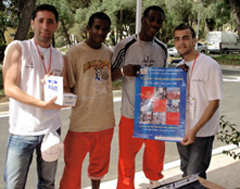
UNAIDS Executive Director Michel Sidibé (left) met with the President of the Algerian Senate, Abdelkader Bensalah, at the Council of the Nation headquarters in Algiers on 2 April.
Algeria’s early and swift response to the HIV epidemic has kept national HIV prevalence low, at approximately 0.1% of the population. Since 1998, the government has offered free antiretroviral treatment to all people who are eligible. New HIV infections among children in Algeria have been virtually eliminated.
In a meeting on 2 April with the President of the Algerian Senate, Abdelkader Bensalah, UNAIDS Executive Director Michel Sidibé commended Algeria as a champion in the AIDS response—both at home and across the region.
During his meeting with Mr Bensalah at the Conseil de la Nation headquarters in Algiers, Mr Sidibé acknowledged the critical role that Algeria has played in mobilizing high-level commitment for the AIDS response within the African Union and in the League of Arab States. He noted that Algeria’s Chairmanship of the Group of 77 (G-77) provides an important platform for galvanizing further support for the regional response to HIV.
Touching on a theme from his recent missions in Africa, Mr Sidibé praised Algerian leaders for funding more than 93% of national HIV programmes through domestic sources. “Across Africa, too many countries remain too dependent on external HIV aid. Algeria’s country-owned HIV response is an example for others to follow,” he said.
Speaking on behalf of President Abdelaziz Bouteflika, Mr Bensalah underscored that the Algerian government hopes to finance 100% of its AIDS response in the coming years. He said that Algeria is committed to the targets of the 2011 Political Declaration on AIDS and to the UNAIDS vision of zero new HIV infections, zero discrimination and zero AIDS-related deaths.
A call for a more inclusive society
Religion must play an important role in preventing HIV and addressing questions around drug use and sexuality
Algeria’s Minister of Religious Affairs, Mr Bouabdellah Ghlamallah
Meeting later in the day with Algeria’s Minister of Religious Affairs, Mr Bouabdellah Ghlamallah, Mr Sidibé requested the Minister’s support in ensuring a more inclusive society based on tolerance, compassion and respect for all human beings. He said that people of Islamic faith could promote HIV prevention by serving as a bridge between scientific evidence and social change.
Mr Ghlamallah reaffirmed the Ministry’s support for people living with HIV and populations at high risk of HIV infection. He said that the Ministry would continue to support El Hayet—a non-governmental organization of people living with HIV—in its efforts to reach the goal of zero discrimination.
“Religion must play an important role in preventing HIV and addressing questions around drug use and sexuality,” said the Minister.
Partnership to promote AIDS research

UNAIDS Executive Director Michel Sidibé (left) and the Algerian Minister of Health, Dr Djamel Ould Abbès, signed an agreement on 2 April to create an African AIDS Research Centre in Tamanrasset, Algeria.
During his mission, the UNAIDS Executive Director signed an agreement with the Minister of Health, Dr Djamel Ould Abbès, to establish an African AIDS Research Centre in Tamanrasset, a city in southern Algeria. Scheduled to open in 2013, the Centre will facilitate the regional exchange of scientific knowledge and expertise in the domain of HIV and public health.
“This is a ‘win-win’ partnership between UNAIDS and the Government of Algeria,” said Dr Ould Abbès, noting that the collaboration would marry the technical expertise of UNAIDS with Algeria’s national resources and regional contacts.
Addressing stigma and discrimination
Speaking with key partners in the HIV response on 1 April—including health professionals, government officials, AIDS activists, people living with HIV and representatives of the United Nations—Mr Sidibé underscored the need to intensify national and regional efforts to eliminate stigma and discrimination.
“Stigma drives people living with HIV and populations at high risk of HIV infection underground,” said Mr Sidibé. “It prevents vulnerable populations from accessing the HIV and health services they need.”









